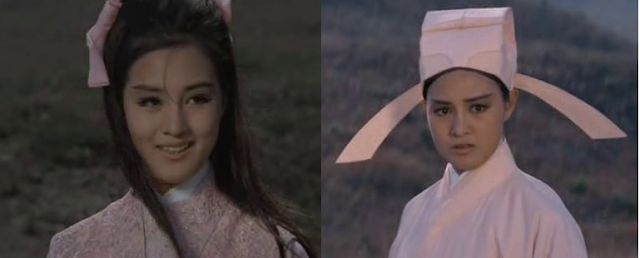THE FLYING DAGGER (1969)
Ladies and gentlemen, the man himself is back, the great Sir Run
Run Shaw produces from the "throw back" vault (hence the black and
white opening) his trusted director Chang Cheh who writes the script with pal
Lee Chi-Sin as they all watch action director team Tang Chia and Liu Chia-Liang
slash together the classic film THE FLYING DAGGER (1969). And if you had as
much fun reading the preceding bit as I had writing it we might be blood
related, let's get busy!
Did you ever have a thought
to do something that, while you were thinking it, seemed like a great idea at
the time. So you did it. And then, all of this crap comes down after it and you
realize you really didn't think it through? You too, huh? Cool, so Yu Ying of
the Qiankun Sword Clan (who just happens to be the daughter of the clan's chief) decides to kill the son of the
Green Dragon Clan's Chief who just happens to be Jiao Lei the Flying
Dagger...oops! Never mind that his son was a killing, raping and then killing
again type of a son-of-a-gun. Parents just don't see their children in that
kind of light.
Chief of the
Green Dragon Clan, Jiao Lei the Flying Dagger gets all mad and revengey and
starts killing everybody just to get to Yu Ying and for good measure clearly
intends to kill her father, Yu Yuan, Chief of the Qiankun Sword Clan as well.
So, after killing the legendary Luo Tong and Song Jingang and his four sons,
while killing the Song's servants and children a real badass guy shows up with
a similar skill set as The Flying Dagger. His name? Yang Qing, badass, mystery
man extraodinaire. Ready, set --begin story!
THE FLYING DAGGER
(1969) stars Cheng Pei Pei as Yu Ying the well intentioned pursued damsel of
our story. Yeung Chi-Hing is the revengey pursuer and father Jiao Lei the
Flying Dagger, the mad cap murderer. Lo Lieh is Mr. Badass extraordinaire man of
mystery who sometimes seems to help and other times not so much.
HONORABLE MENTION: There are a lot of
recognizable faces here: Cheng Miu as Yu Yuan the father of the pursued, Ku
Feng as Song Jingang, and even Liu Chia-Liang, Cliff Lok, David Chiang
Dai-Wei and Liu Chia-Yung have small cameos.
FIGHT TIME: The
incredible action direction team of Tang Chia and Liu Chia-Liang are
responsible for what action we see here as I counted six (6) fight scenes including the
rather tame finale. Everybody's fight scenes are well done but I would have
liked a bit more in the way of technique in the scenes. However, I found in my
research that THE FLYING DAGGER (1969) was actually filmed years earlier and its
released delayed but no reason for the delay was given. This helps me to be a
bit more forgiving of the relatively sedate nature of the fights as the truth
of the matter is we could always use "more".
HONORABLE
MENTION: none
If you liked this review please comment on the blog, become a
follower of the blog, join me on my Facebook account by sending me a message
first and then a friend request so I know who I am friending (
https://www.facebook.com/Michael529P ) and like my Facebook page:
SHAW Brothers Kung Fu Movies 1965-1986. I thank you and would appreciate it
very much!
NEXT UP: THE INVINCIBLE FIST (1969)
































